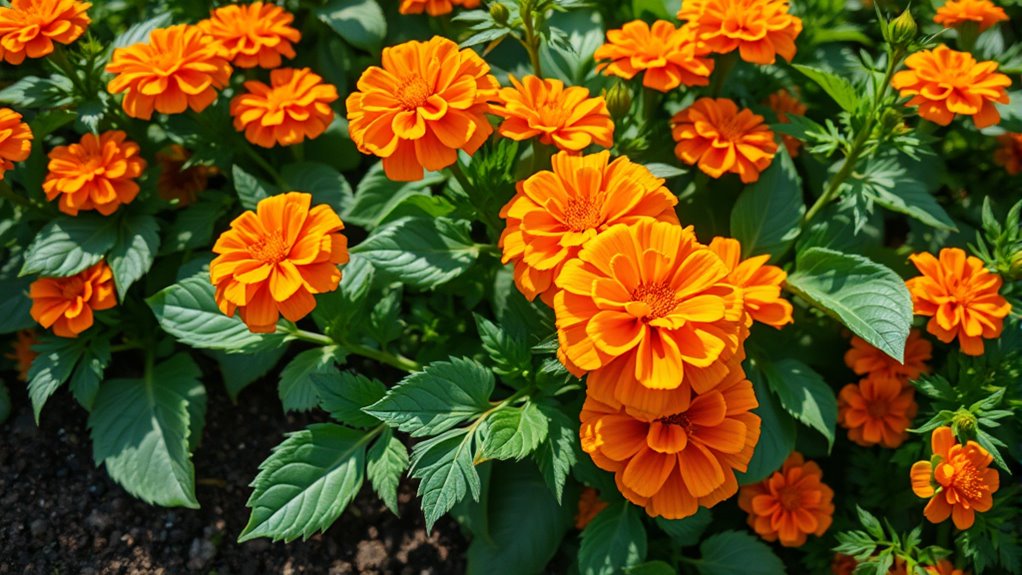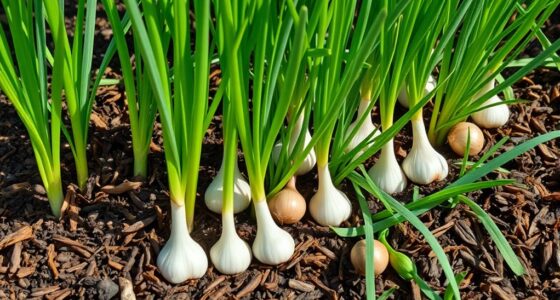Planting flowers like marigolds, nasturtiums, calendula, and sunflowers alongside your vegetables creates a natural pest shield. These blooms attract beneficial insects that prey on pests, while their scents confuse or repel harmful bugs like aphids and nematodes. They also help foster a balanced ecosystem that supports pollinators and promotes healthier plants. Want to discover how to maximize your garden’s natural defenses? Keep exploring for more tips on protecting your veggies naturally.
Key Takeaways
- Marigolds emit scents that repel pests like nematodes, aphids, and whiteflies, protecting vegetable crops naturally.
- Flowers like nasturtiums and calendula attract pests away from vegetables or repel harmful insects.
- Sunflowers act as barriers, shielding vegetables from pests and attracting beneficial birds that feed on pests.
- Planting a variety of companion flowers encourages beneficial insects and pollinators, boosting garden health and productivity.
- Using flowers for pest control reduces the need for chemical pesticides, promoting organic and sustainable gardening practices.

Planting certain flowers near your vegetables can naturally ward off pests and boost your garden’s health. This practice, known as companion planting, is a smart way to create a balanced environment where beneficial insects thrive and harmful pests are kept at bay. When you choose the right flowers, you’re not only beautifying your garden but also enhancing its resilience. Many flowers have natural pest deterrents, making them invaluable allies in organic gardening.
One of the most well-known flowers for pest deterrents is the marigold. Its vibrant blooms emit a scent that confuses and repels many common pests like nematodes, aphids, and whiteflies. By planting marigolds around your vegetable beds, you create a barrier that pests find difficult to penetrate. The strong scent acts as a natural repellent, reducing the need for chemical pesticides. Plus, marigolds attract beneficial insects such as ladybugs and hoverflies, which prey on pests, further protecting your crops. Their ease of growth and bright colors make them a popular choice for gardeners looking to implement companion planting effectively.
Marigolds emit a scent that repels nematodes, aphids, and whiteflies, protecting your vegetable garden naturally.
Beyond marigolds, other flowers also serve as excellent pest deterrents. Nasturtiums, for example, attract aphids away from your vegetables, acting as a trap crop. When aphids congregate on nasturtiums, they’re less likely to attack your beans or spinach. Calendula, or pot marigold, not only adds a cheerful splash of color but also produces compounds that repel beetles and other pests. Sunflowers, while often admired for their height and beauty, can also serve as natural pest barriers. Their towering presence can block pest access to lower-growing vegetables, and their seeds attract birds that feed on garden pests.
Incorporating these flowers into your garden isn’t just about pest control; it’s about creating a harmonious ecosystem. When you plant flowers that serve as pest deterrents, you encourage beneficial insects and pollinators to visit, which boosts your vegetable yields. You’ll notice fewer pest outbreaks and healthier plants overall. The key is to strategically place these flowers near your vegetable crops, ensuring they’re accessible to beneficial insects while creating a confusing environment for pests. This approach reduces your reliance on chemical controls and promotes a more sustainable, thriving garden.
Frequently Asked Questions
Can Marigolds Repel All Types of Garden Pests?
You wonder if marigolds can repel all types of garden pests. While they’re known for their pest repellent effectiveness, marigold diversity means some pests may still find their way into your garden. Marigolds work well against certain insects like nematodes and aphids, but they aren’t a universal solution. To protect your veggies fully, combine marigolds with other pest control methods for better results.
Are There Specific Marigold Varieties Better for Vegetable Gardens?
Perfect pest deterrent plants depend on your garden’s needs. Certain marigold varieties, like French and signet marigolds, are especially effective for veggie gardens. These pest-fighting flowers emit scents that deter pests and protect your plants naturally. By choosing these specific marigold varieties, you harness the power of pest deterrent plants, boosting your garden’s beauty and bounty. So, select the best marigolds to maximize garden health and harmony.
How Close Should Marigolds Be Planted to Vegetables?
You should plant marigolds about 8 to 12 inches apart from your vegetables, following recommended planting distances for effective companion planting tips. This close proximity helps marigolds release natural compounds that deter pests and protect your crops. Keep in mind, proper spacing guarantees good air circulation and healthy growth. Incorporating marigolds within this range maximizes their pest-repelling benefits while supporting a thriving vegetable garden.
Do Marigolds Require Special Soil or Watering Conditions?
Imagine vibrant marigolds brightening your garden, their fiery blooms standing tall amid lush green leaves. You’ll find they prefer well-draining soil with rich organic matter, but they’re pretty adaptable and don’t require special soil preferences. For watering needs, keep the soil evenly moist but not soggy, watering when the top inch feels dry. With these simple conditions, your marigolds will thrive and help protect your veggies naturally.
Can Other Flowers Also Help Protect Vegetable Crops?
Yes, other flowers can also help protect your vegetable crops through companion planting. By planting flowers like nasturtiums, calendulas, or cosmos nearby, you create natural pest control strategies that deter pests and attract beneficial insects. These flowers support your garden’s health by enhancing biodiversity and reducing the need for chemical pesticides. Incorporate a variety of flowering plants to maximize your pest control efforts and keep your vegetables thriving naturally.
Conclusion
By planting marigolds alongside your veggies, you create a natural shield against pests. Imagine seeing your tomatoes flourish without a single bug in sight, thanks to those vibrant blooms. Think of Emma’s garden, where marigolds kept beetles away, allowing her veggies to thrive. You can experience this peace of mind too—just add a splash of color and let nature’s protectors do the work. Your garden’s health and beauty are worth it.









